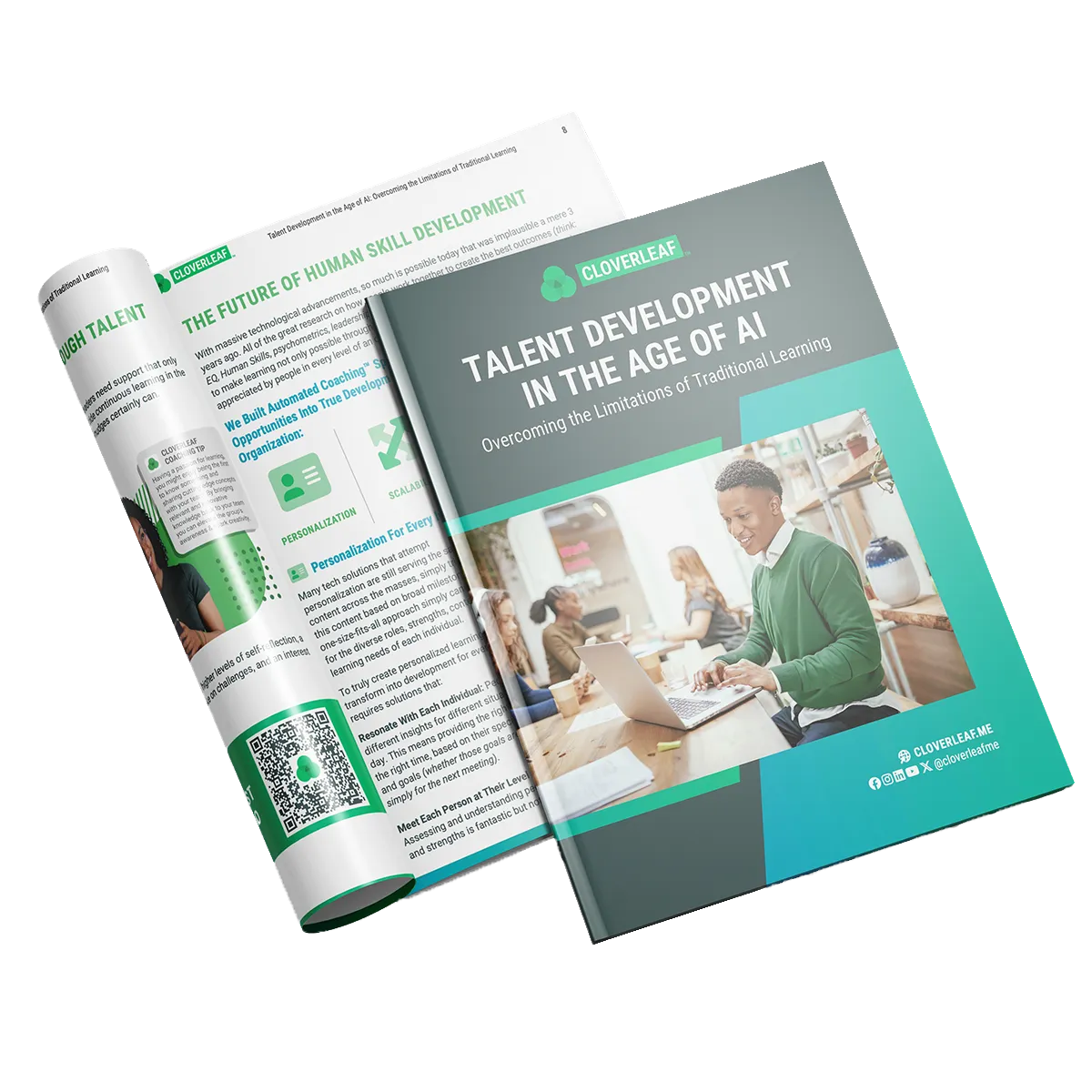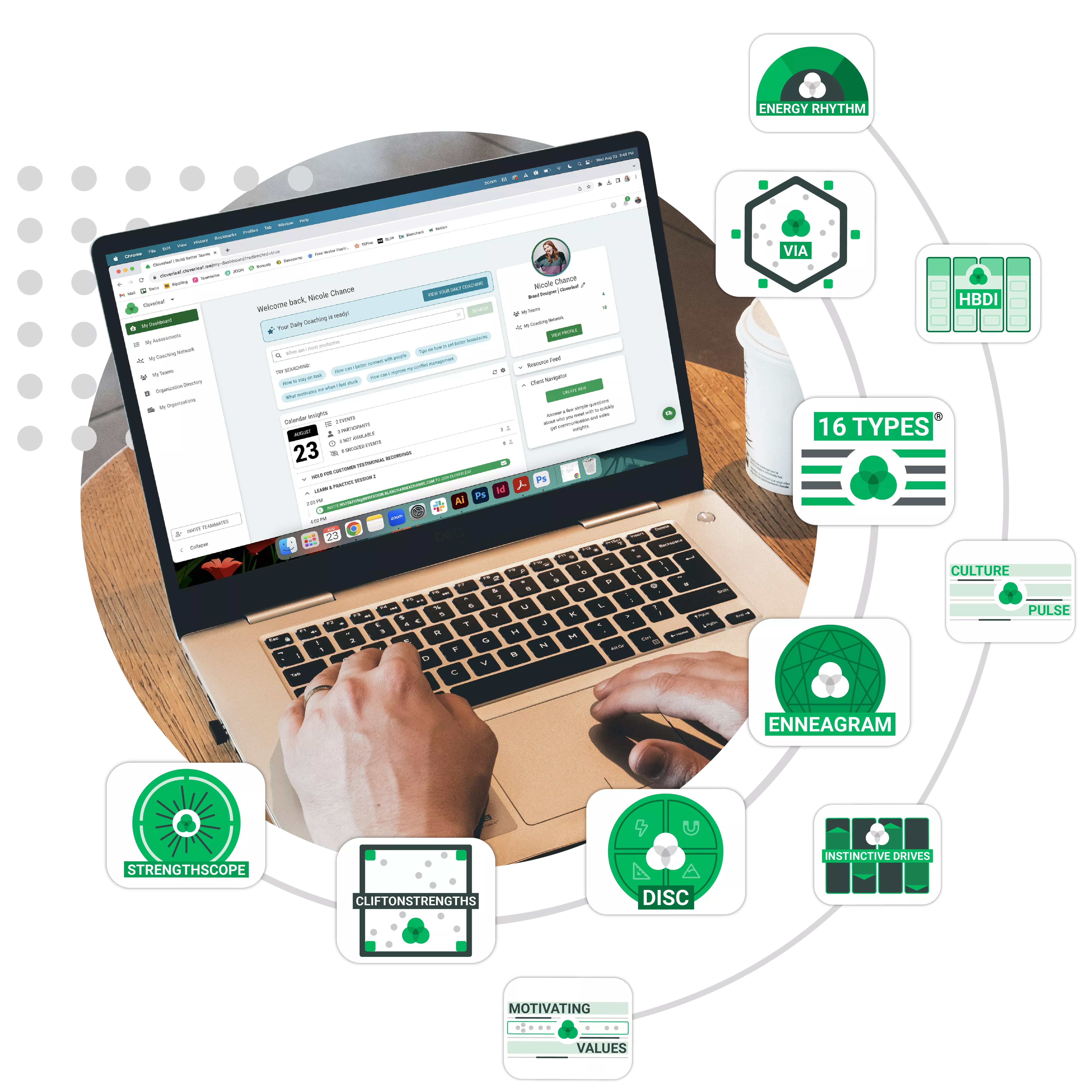Think about the kind of workplace where managers do more than just check off tasks and meet deadlines. You need people who lead—where they inspire, connect, and motivate their teams to do their best work every day. Getting to this point isn’t easy. The magic lies in those often overlooked but crucial human skills.
Emotional intelligence (EQ), active listening, and empathy aren’t just “nice-to-haves.” They’re the real tools that help managers handle the daily grind—whether it’s resolving conflicts, guiding teams through change, or keeping collaboration strong, even when the pressure is on.
How do you make these human skills second nature for your managers? How do you help equip managers with these “soft” skills to deliver hard-hitting results that everyone can see and measure? Talent develop leaders have a solid grasp on why these skills matter—now it’s time to dive deeper and explore how to embed them so deeply in your team’s DNA that they become the bedrock of your organization’s success.

The 5 Human Skills For Managers That Are Most Needed Today
The pressure on managers is immense. They’re not just expected to drive results—they need to inspire, connect, and lead with empathy. But as you know, not all skills are created equal. While technical expertise and strategic thinking are critical, they only go so far. Human skills are the real differentiators that turn a good manager into a great leader.
But with so many demands on their time, which human skills should managers first focus on developing to truly make an impact? Let’s break down the five human skills that matter most today—and why they should be at the top of your priority list.
1. Building Trust
Trust isn’t just important—it’s essential. Research by Paul Zak from the Harvard Business Review shows that high-trust organizations are more productive, with 74% less stress, 50% higher productivity, and significantly more energy at work. Managers who are authentic and open create an environment where team members feel safe to share ideas and take risks, which is crucial for fostering innovation.
2. Resolving Conflicts
The inability for managers to effectively navigate conflict and bring about positive resolution is costing them nearly one full day of productivity per month, or two and a half weeks per year. – Dr. Robyn Short Conflicts that aren’t resolved quickly disrupt team dynamics, lower morale, and lead to significant productivity losses. However, managers who are skilled in emotional intelligence and active listening can defuse conflicts before they escalate, ensuring that their teams remain focused and unified.
3. Navigating Change
Leading through change and uncertainty is one of the most challenging aspects of management. A study by Gartner found that only 34% of change initiatives are a clear success, with employee resistance cited as a primary reason for failure. Managers who excel in communication, directly address concerns, and lead by example can significantly reduce resistance and improve the success rate of change initiatives.
4. Improving Team Collaboration
In diverse teams, differences in perspectives and backgrounds can drive innovation or lead to miscommunication and conflict. Teams with higher cognitive diversity—where members have different ways of thinking—are more innovative and better at problem-solving, particularly in complex and uncertain environments. Managers who value and leverage these diverse perspectives can create an environment where collaboration flourishes, turning potential friction into creative solutions and growth opportunities.
5. Managing Stress and Burnout
Stress and burnout are more than just buzzwords—they’re real threats to productivity and well-being. The World Health Organization (WHO) has officially recognized burnout as an occupational phenomenon, linking it to decreased productivity, higher turnover, and absenteeism. Managers who can practice resilience and emotional regulation can manage their stress and recognize early signs of burnout in their teams to take steps to address it before it becomes a bigger issue.
Knowing the importance of these human skills is one thing, but developing them into the daily fabric of your team’s work is another challenge altogether. It’s easy to feel like you’re doing everything you can yet still falling short of making these skills stick.
But here’s the good news:
you don’t have to tackle this alone, and it’s not about adding more to your plate. It’s about making small, intentional shifts that can lead to big changes. To do so, you must first understand the blockers preventing a stronger, more resilient, and more connected team.

Ready To Build Human Skills At Scale With Your Managers?
- Close the gap between learning and on-the-job application
- Personalize growth to individual strengths and needs
- Integrate learning so it is actually in the flow of work
- Develop human skills fast enough to solve business problems
- Prove the ROI of your development programs

4 Roadblocks That Get In The Way Of Developing Human Skills
When it comes to developing human skills in the workplace, it can often feel like trying to squeeze one more thing into an already packed schedule. Managers constantly juggle a multitude of tasks, leaving little time for focused development efforts. For Talent Development Leaders, the challenge is twofold: not only do they need to find ways to integrate these crucial skills into the daily grind, but they also have to overcome several significant obstacles that can derail even the best-intentioned efforts.
1. Time Constraints
Managers are often stretched thin, with daily responsibilities that leave little room for anything beyond immediate tasks. The pressure to deliver results can make skill development feel like a luxury rather than a necessity. This perception is compounded by the belief that time spent on development activities detracts from “real work.” However, this mindset overlooks the long-term benefits of human skills development, which can actually lead to more efficient and effective teams.
2. Limited Resources
The struggle for resources is a common issue, especially when it comes to intangible assets like human skills. Whether it’s a lack of budget, tools, or access to skilled facilitators, Talent Development Leaders often find themselves fighting an uphill battle. In many organizations, leadership may not fully grasp the return on investment (ROI) that human skills development can provide, leading to underfunding or underutilization of available resources. This can be particularly frustrating when there’s clear evidence that organizations with robust human skills training see significant improvements in employee engagement and retention.
3. Resistance to Change
Change is never easy, and when it comes to human skills development, resistance can be especially strong. Managers may be skeptical about the value of such training or uncomfortable with the idea of altering established behaviors. This resistance is often exacerbated by a lack of organizational buy-in, making it difficult to foster a culture that prioritizes continuous development.
4. Difficulty Measuring Impact
One of the most significant challenges in human skills development is proving its effectiveness. Traditional metrics, such as surveys, often fail to capture the full impact these skills have on organizational performance. This can make it difficult to justify continued investment in these programs. However, innovative approaches to measurement are emerging. For example, some organizations are using data analytics to track behavioral changes over time and correlate them with key performance indicators (KPIs).
Quantifying improvements in collaboration, problem-solving, and leadership skills draws a direct line between individual development and tangible business outcomes. This approach transcends traditional sentiment surveys to paint a more accurate picture of Talent Development’s value.
It’s clear that developing the human skills of managers has it’s challenges, but these obstacles aren’t insurmountable. The role of talent development is crucial in breaking down these barriers, challenging old models, and embedding these skills into the daily practices of your managers. The next step is to move beyond recognizing these roadblocks and to actively implement strategies that drive real change. In the following section, we’ll dive into advanced strategies that are specifically designed to overcome these challenges and elevate human skills within your organization.
4 Advanced Strategies To Empower Managers To Develop Human Skills
Developing emotional intelligence (EQ) and empathy in leaders is not something that is achieved through a single training session. It requires a deliberate, multi-faceted approach that goes beyond traditional learning methods. To truly cultivate these critical human skills, you need strategies that are both targeted and practical, focusing on self-awareness, social awareness, and the consistent application of these skills in real-world settings. Here are some advanced techniques that can enhance or build upon existing development programs:

1. Self-Assessment Tools
For managers assessments like DISC, 16 Types, and the Enneagram are invaluable not just for identifying personality traits but for applying these insights to navigate the complex dynamics of leadership. When managers understand both their own tendencies and those of their team members, they can adapt their leadership approach to meet individual needs, handling tricky situations with greater finesse and effectiveness.
By integrating these tools into daily leadership practices, managers gain deeper insights into their team members’ motivations and communication styles, allowing them to tailor interactions and model a more inclusive and high-performing work environment. This nuanced approach can improve team dynamics and position leaders to better manage change, resolve conflicts, and drive innovation.
2. Dedicated Team Development Time
The challenge lies not in convincing managers to invest time in development but in maximizing the impact of that time. Consider restructuring development time to focus on real-time team challenges rather than abstract exercises. Use these sessions to simulate high-pressure scenarios that mirror your team’s daily struggles, allowing leaders to practice emotional intelligence in a controlled environment.
A study by the Kenexa Research Institute discovered that 50% of positive changes in communication can be attributed to social interactions outside of work-related matters, which include team building activities. This approach can help deepen their empathy and social awareness. It can also provide immediate, applicable insights they can carry back into their daily interactions.
3. Continuous Feedback and Peer Learning
To truly elevate the effectiveness of feedback, integrate it with peer learning in a way that challenges conventional thinking. Instead of standard feedback loops, create cross-functional peer coaching partnerships where managers can offer fresh perspectives on each other’s challenges. This method encourages out-of-the-box thinking and exposes managers to diverse leadership styles and problem-solving approaches.
4. Real-Time Behavioral Nudges
Technology can play a pivotal role in reinforcing emotional intelligence throughout the workday. Tools like Automated Coaching™ deliver micro-nudges—small, personalized reminders that prompt managers to apply their emotional intelligence skills in real time. These nudges are contextual and tailored to specific situations, helping managers practice empathy and emotional regulation exactly when it’s needed most.

How to Build Human Skills for Managers at Scale with Technology
Talent Development Leaders face the challenge of not just training managers, but truly transforming them—equipping them with the human skills necessary to lead effectively in an ever-evolving environment. This requires more than periodic workshops or role-based training programs. It demands a personalized, continuous, integrated approach that meets managers where they are and when they need it most.
Automated Coaching™ does exactly that. It redefines what’s possible in leadership development by embedding real-time, personalized coaching directly into the daily workflow. This isn’t about abstract theories or broad-brush training; it’s about delivering specific, actionable insights tailored to the unique challenges each manager faces.
Whether it’s navigating a difficult conversation, giving feedback, or leading through change, Automated Coaching™ provides the right guidance at the right moment, seamlessly integrated into the tools managers already use. This approach ensures that learning is not only relevant but also immediately applicable, making growth a continuous, natural part of a manager’s daily experience.
Integrating these micro-coaching moments into tools like calendars and email ensures that learning happens in the context of actual work, making it more relevant and impactful. Automated Coaching™ empowers leaders to customize and adjust the their approach tomeet evolving needs and unique needs of each person on their team.
Relevant Data & Trends in Human Skills Development
A recent report by McKinsey on workplace productivity underscored the importance of people leaders who are well-connected to their teams. These leaders play a pivotal role in maintaining morale and engagement by ensuring that employees feel valued and that their career paths are clear. The report suggested that organizations focusing on human skill development, particularly in leadership, saw better team dynamics and a reduction in disengagement, which directly correlated with improved productivity.
As we look ahead, several trends are shaping the future of human skills development, offering new opportunities for organizations to focus on this critical area. While many Talent Development may be overwhelmed by AI being a central topic in just about every conference session related to human capital management, we can’t avoid it. Here are a few other trends to consider, some which include AI:
a. Personalization: The move towards personalized learning experiences is not just a trend—it’s becoming a necessity. AI and data analytics are enabling organizations to tailor training, coaching and development programs to the individual needs, learning styles, and career goals of employees. This level of personalization ensures that content is not only relevant but also impactful, leading to more effective skill acquisition and application.
b. Digital Experiences in The Flow of Work: As the workplace becomes increasingly digital, leveraging technology that provides development in the flow of work without disruption is becoming increasingly attractive. The more technology can fuel development in ways that are not stressful to employees but actually delightful, the easier it will be to get buy-in for participation. (And yes, AI will be at work here too!)
c. Leadership Development Emphasis: Leadership development will continue to be a critical area of focus, particularly as organizations navigate the complexities of hybrid and remote work environments. Future leaders will need to be equipped with advanced human skills, including emotional intelligence, adaptability, and the ability to inspire and engage distributed teams. Talent Development Leaders must follow this trend by shifting how we promote and hire for leadership roles and include these critical skills within job descriptions.
d. Community Learning & Collaboration: The rise of learning platforms and collaborative tools will transform how human skills training is delivered. Peer-to-peer learning, mentorship, and collaborative projects will be integral to talent development strategies. Tools that invite more frequent and effective collaboration will become the secret weapon for Talent Development Leaders.
The future of human skills development is being shaped by personalization, technology integration, and a renewed focus on leadership in a hybrid world. As these trends continue to evolve, organizations that embrace them will be better positioned to cultivate leaders who are not only effective but also deeply connected with their teams. Talent Development Leaders who recognize and act on these trends will drive the next generation of leadership, ensuring that their organizations thrive in an increasingly complex and dynamic environment.
Embracing Continuous Growth
Human skills are not just a fleeting trend—they are the bedrock of a thriving, resilient workforce. As the workplace continues to evolve, the ability to leverage emotional intelligence, effective communication, and seamless collaboration will be the key to forming teams that are not only productive but also engaged and adaptive. However, developing these skills demands more than traditional approaches; it calls for innovation, sustained commitment, and the right resources. Here’s how you can take action to ensure your teams are equipped for continuous growth:
1. Critically Assess Your Current Programs
Take a hard look at your existing learning, training, and coaching initiatives. Are they truly fostering the human skills that your teams need to excel? Move beyond surface-level metrics and dig deep into what’s working and what isn’t. It’s time to reimagine your development strategies to drive real, meaningful growth. This isn’t just about checking a box—it’s about transforming your workforce to meet the demands of today and tomorrow.
2. Future-Proof Your Workforce
Don’t just focus on the challenges your teams face today; anticipate what’s coming next. Identify the learning gaps within your organization by gathering comprehensive qualitative and quantitative feedback. Use these insights to craft a forward-looking strategy that not only addresses current needs but also equips your workforce to handle future challenges with confidence and agility.
3. Equip Your Team with Results-Driven Technology
To elevate your team’s effectiveness, it’s not enough to have tools—you need the right tools that drive measurable impact. Identify solutions that can truly transform your development efforts, and build a compelling case for stakeholder buy-in. Your investment should translate into tangible growth, ensuring that your teams are not just prepared for the future but are leading the way.
Empowering Managers with Human Skills for the Future
Managers who operate with a strong sense of human skills will be the ones who build resilient, engaged teams that can thrive amidst change and uncertainty. The development of human skills highlights the importance of personalized, real-time coaching and continuous learning.
Are your current development programs truly preparing your managers to lead with these essential skills? It’s time to reassess, innovate, and invest in the right tools to ensure that your managers are not just keeping up, but leading the way. Cloverleaf’s Automated Coaching™ offers the ideal solution to help you embed these human skills deeply into your leadership culture.
Let’s work together to elevate your managers to the next level of leadership. Book a demo today and see how Automated Coaching™ can help you create a team of managers who lead with the human skills that will drive your organization’s success.







